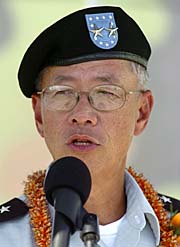
Ridge due at isle
security event
The conference in Waikiki
will highlight ways to develop
a more secure Asia-Pacific region
The head of Hawaii civil defense says he expects the nation's color-coded terror alert system during President Bush's second term will operate in the same way the state system has worked since it was established after the Sept. 11, 2001, terrorist attacks.
![]()

![]()
Tom Ridge: The Homeland Security chief is expected to describe goals for Bush's second term
"When (Homeland Security) first came into being, look back at the number of times they went to the heightened alert level nationwide -- quick to pull the trigger," Lee said, noting that Hawaii's threat level is based mostly on specific information for the region.
"Look at recently how they've done business," Lee said. "They went to regions where the intelligence and the threat seemed imminent, instead of jerking the entire nation around."
Lee said he expects to hear more of the agency's plans for the next four years this week, when Homeland Security Secretary Tom Ridge addresses a conference aimed at devising security strategies for the Asia-Pacific region.
Ridge is scheduled to deliver the keynote address at tomorrow's opening session of the second Asia-Pacific Homeland Security Summit in Waikiki. The three-day conference brings together security officials, scholars and other representatives from 40 countries to discuss strategies.
Ridge addressed the conference last year via live video conference.
"I think his visit out here will kind of validate that Hawaii is the spot for homeland security for our Asia-Pacific nations," Lee said.
![]()

![]()
Robert Lee: The state adjutant general notes more region-specific security tactics
But Sheila Smith, a research fellow at the East-West Center in Honolulu, said she is not quite sure what that message will be.
"I don't know -- the election campaign was fraught with all kinds of accusations about how insufficient homeland security efforts have really been," Smith said.
Lee said the agency's new strategy was seen this summer, when Homeland Security raised the terror threat level around five eastern financial centers to orange ("high" risk), without raising the alert status for the entire country. The threat level was lowered to yellow ("elevated" risk) last week.
Lee said the next phase of Homeland Security will be aided by conferences similar to the Hawaii summit that aim to develop methods of sharing information and building partnerships among nations.
"The first couple of years (Homeland Security) had focused on keeping the United States safe," Lee said. "Now, with borders and immigration issues and all that, I see the next phase as the United States overall reaching out to foreign countries and building the anti-terrorism network.
"I think we've got a head start on the rest of the United States in what we're doing in the Asia-Pacific."
Smith agreed, noting that alliances with other countries began to solidify after those nations experienced terrorism on their own soil.
"After the Bali bombing and after the more recent attack of the Australian embassy," Smith said, "the Indonesian government has become much more interested in cracking down on terrorism and that much more willing to see the international connections that may be linked to Indonesia's own experience with terrorism.
"What you're seeing is a more integrated kind of building of a web of information that will help track and follow those people that are suspected of committing terrorism."
Other speakers scheduled to address the conference include:
» Rohan Gunaratna, professor, Institute of Defense & Strategic Studies, Singapore.
» Ong Keng Yong, secretary general, Association of Southeast Asian Nations.
www.hlssummit.hawaii.gov
East-West Center
www.eastwestcenter.org